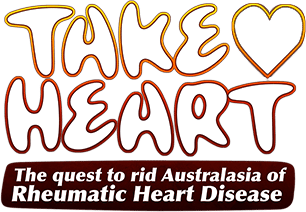MEDIA
TAKE HEART on THE BLUE ROOM
Take Heart of Rheumatic Heart Disease
By Dr Rob Grenfell
You may not have heard of Rheumatic Heart Disease (RHD), but it is a killer in this country, particularly among Indigenous Australians living in the Northern territory. In fact, Australia has one of the highest rates of RHD in the world. And the worst thing? Almost every case of RHD is preventable if caught and treated early.
What is rheumatic heart disease?
RHD can develop when there is damage to the heart muscle or valves caused by acute rheumatic fever (ARF), an illness that causes inflammation of the heart and other parts of the body.
This damage can permanently stretch and/or scar the heart valves, which then affects the normal flow of blood through the heart and out to the rest of the body.
If left untreated, people with RHD can develop complications including an irregular heartbeat (arrhythmia), inflammation of the inner layer of the heart (endocarditis) and heart failure, have a stroke, and also experience complications during pregnancy. These conditions can lead to reduced quality of life, disability and premature death in young adults.
Heart surgery can help treat some of these issues, but it is not a cure.
What causes acute rheumatic fever?
Acute Rheumatic Fever (ARF) is an illness caused by your body’s response to an infection caused by group A streptococcus bacteria (commonly known as ‘strep’ bacteria). The strep bacteria usually cause throat infections (‘strep’ throat) and skin sores.
When the body fights the infection, the immune system can sometimes over-react, by also attacking and causing inflammation in other uninfected parts of the body. This condition is called acute rheumatic fever, or ARF.
What are the symptoms of Acute Rheumatic Fever?
Symptoms of ARF include:
Fever.
Heart problems including inflammation, chest pain, heart failure.
Joint pain and swelling.
A bout of AFR can last several weeks and usually doesn’t cause lasting damage to the body, except for the heart valves. Repeated strep infections causing ARF can have a cumulative effect on the heart, causing more damage with each infection.
Who is at risk of developing RHD?
Aboriginal and Torres Strait Islander people are at high risk of developing RHD, particularly those living in rural and remote areas in central and northern parts of Australia, but Aboriginal and Torres Strait Islander people living in some urban areas may also be at risk.
How can we help?
Today marks the launch of Take Heart, a documentary on RHD narrated by Walkley Award winning journalist Stan Grant. Please, take some time to watch it today. With awareness, we can help catch rheumatic fever in its early stages and treat it, and help prevent unnecessary disease and death in Australia.
Take Heart on The Blue Room
Link to original story on Bupa’s Website.





















